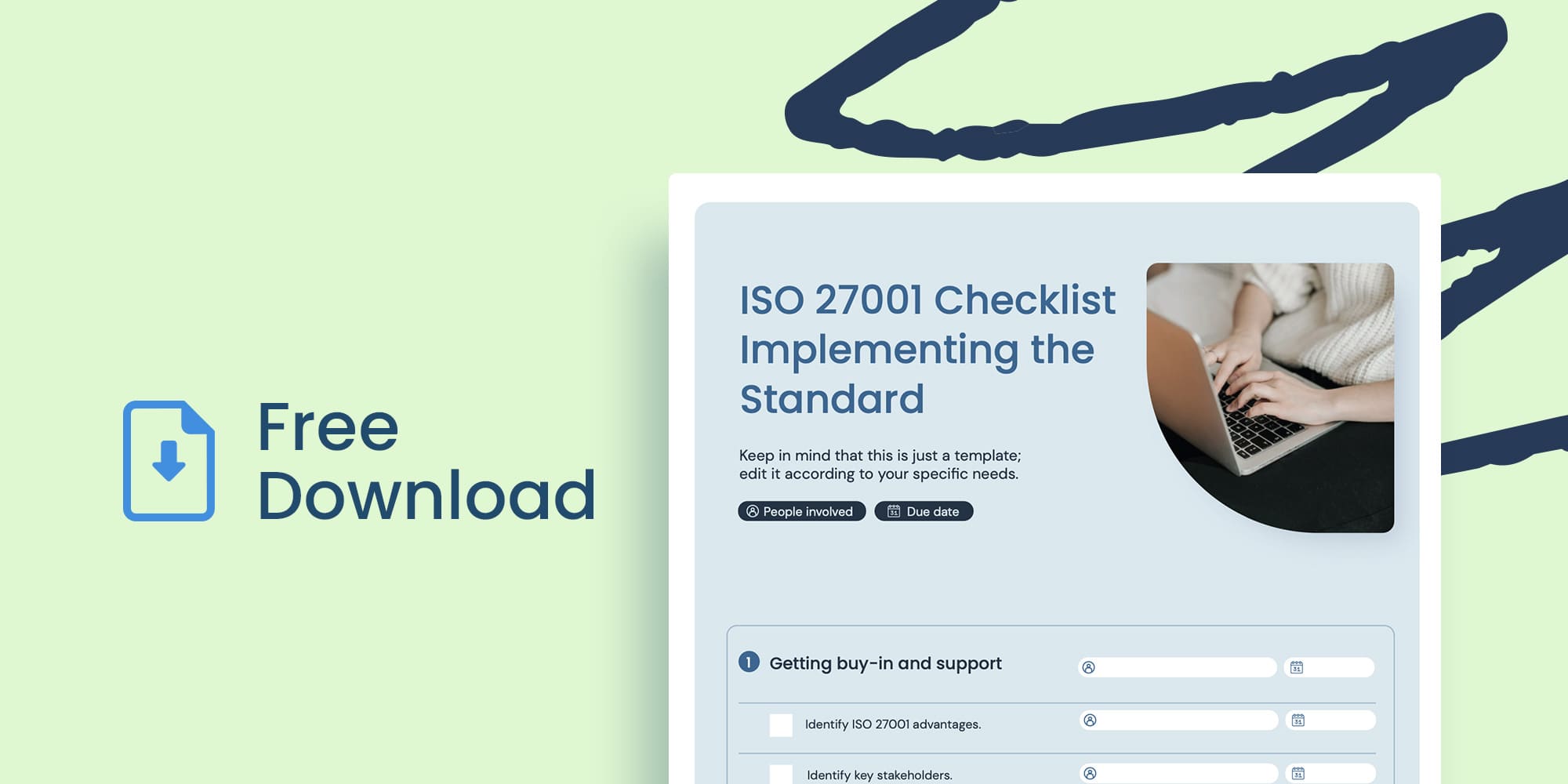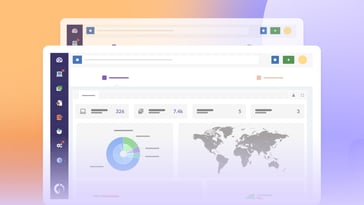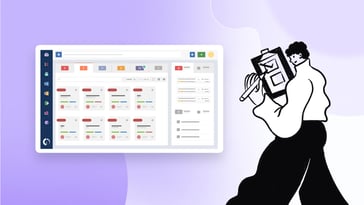Compliance standards are designed to create a robust framework that protects sensitive data from threat actors and ensures organizational integrity. Without them, organizations will be compromising both their IT security and privacy.
If you are an IT manager, cybersecurity professional, legal advisor, or your employer has promoted you to be the new compliance officer, your aim is to ensure your organization's technology infrastructure meets regulatory requirements.
To help with this, in this article, we'll uncover what compliance standards are all about, why they matter, and how they can be effectively implemented. We will also explore the ten most important options out there.
Let 's dive in.
What are compliance standards?
Compliance standards are guidelines and regulations that organizations follow to ensure legal, ethical, and operational integrity.
These standards fall into the jurisdiction of Compliance Management, providing a structured approach to managing risks, preventing fraud, and maintaining transparency within an organization.
There are different compliance standards tailored for various industries and purposes. For example, healthcare organizations may adhere to HIPAA (Health Insurance Portability and Accountability Act) to protect patient information, while financial institutions might follow SOX (Sarbanes-Oxley Act) to ensure financial accuracy and transparency. Similarly, companies in the insurance claim automation sector must ensure that automated workflows comply with data protection frameworks such as ISO 27001 and SOC 2 to secure sensitive policyholder information.
Additionally, organizations handling payment card information must comply with PCI-DSS (Payment Card Industry Data Security Standard).
IT organizations often adhere to ISO 27001 (Information Security Management) to safeguard their information systems, NIST (National Institute of Standards and Technology) guidelines for robust cybersecurity frameworks, and AICPA SOC 2 (System and Organization Controls) for service organizations to manage customer data based on five "trust service principles" — security, availability, processing integrity, confidentiality, and privacy.

Why is regulatory compliance important?
Regulatory compliance is essential because it ensures that organizations operate within the boundaries of the law, protecting them from legal penalties, financial losses, and reputational damage.
Remaining in line with regulations is not just a legal obligation but also a business imperative that promotes trust and credibility among customers, stakeholders, and the public.
Let’s illustrate this better:
- Organizations that go beyond mere compliance and proactively engage in ethical practices can differentiate themselves in the market.
- Conformity with safety and quality standards ensures that the products and services offered by the organization meet acceptable safety criteria, thus protecting consumer health and well-being.
- A strong record can make an organization more attractive to investors and business partners who are looking for reliable and ethical collaborators.
- Compliance frameworks often include regular reviews and audits, providing valuable data and insights that can inform strategic decision-making and continuous improvement.
- Regulatory standards can drive innovation by encouraging organizations to develop new solutions to meet compliance requirements.
Ten compliance standards to achieve IT security and privacy
The right compliance standard for your organization will depend on many factors, including the industry you are involved in and your specific regulatory needs and goals.
Here we have put together a list with ten of the most important standards to consider when making the choice. For this, we divided them into two groups, depending on if they are more oriented to security practices or privacy.
Let 's begin.
Top 5 security compliance standards
IEEE ISO 27001
ISO/IEC 27001 is an international standard for managing information security. It outlines a systematic approach to handling sensitive company information, ensuring its confidentiality, integrity, and availability.
An IT service provider that obtains this standard’s certification demonstrates its commitment to Information Security Management. Clients are more likely to trust and engage with a company that has validated its compliance with rigorous security standards such as this one.
For instance, Microsoft achieved ISO/IEC 27001 certification for its Information Security Management systems. This covers a broad range of services including Azure, Office 365, and Dynamics 365. By meeting the standard, the company demonstrates its commitment to critical aspects of information security, ensuring the confidentiality, integrity, and availability of customer data.

AICPA SOC 2
The American Institute of Certified Public Accountants (AICPA) SOC 2 standard focuses particularly on five "trust service principles" — security, availability, processing integrity, confidentiality, and privacy.
It is designed for service providers storing customer data in the cloud, ensuring they adhere to strict information security policies and procedures. This includes organizations that handle sensitive customer data, such as cloud service providers, IT managed services, SaaS companies, and data centers.
In this sense, InvGate recently renewed its SOC 2 compliance, demonstrating its continued commitment to high security and confidentiality standards for clients and potential customers.
CSA STAR
The Cloud Security Alliance (CSA) Security, Trust & Assurance Registry (STAR) certification is a rigorous third-party independent assessment of the security of a cloud service provider. It is based on ISO/IEC 27001 and the CSA Cloud Controls Matrix.
Salesforce holds the CSA STAR certification which provides assurance about the security practices of its cloud services. This certification helps the company offer more transparent information about its security posture to its customers, aiding in Risk Management and fostering trust.
Hitrust
The HITRUST Common Security Framework (CSF) is a certifiable framework that provides organizations with a comprehensive, flexible, and efficient approach to regulatory compliance and Risk Management.
Cerner Corporation, a healthcare technology company, achieved HITRUST CSF certification for its electronic health record system. This certification validates the company's efforts in maintaining a secure and compliant framework that aligns with industry regulations and best practices for managing sensitive health information.
NIST 800-53
The National Institute of Standards and Technology (NIST) 800-53 outlines standards and guidelines for federal information systems. It provides a catalog of security and privacy controls designed to protect information and support mission requirements.
Adhering to NIST guidelines helps an IT company establish a robust cybersecurity framework. This reduces the risk of cyberattacks, which could disrupt operations and lead to significant financial losses. For example, a ransomware attack could paralyze an IT service provider, costing millions in recovery efforts.
IBM implements the NIST 800-53 controls across its federal information systems and services, ensuring compliance with stringent regulations designed to protect federal data. These controls support the businesses initiatives in cybersecurity by addressing requirements for data protection, incident response, and ongoing Risk Management.

Top 5 privacy compliance standards
NIS 2
The NIS 2 Directive is a European Union legislative framework that aims to improve the cybersecurity capabilities of EU member states and ensure a higher level of security for network and information systems.
European Union National Health Services must comply with the NIS 2 Directive to enhance their cybersecurity posture. This involves implementing measures to secure network and information systems against disruptions and breaches, thus ensuring the continuous delivery of critical healthcare services.
European Cyber Resilience Act
The European Cyber Resilience Act is an initiative aimed at ensuring that digital products and services sold in the EU are secure throughout their lifecycle. It sets rules to ensure that hardware and software products are less vulnerable to cyberattacks.
Siemens, a global technology powerhouse, has committed to aligning its product development with the standard, ensuring all digital products and services comply with stringent cybersecurity requirements, thereby reducing vulnerabilities and enhancing product integrity.
CCPA/LGPD
The CCPA (California Consumer Protection Act) is a state statute intended to enhance privacy rights and consumer protection for residents of California. The LGPD (Lei Geral de Proteção de Dados Pessoais) is a Brazilian law that closely mirrors the EU's GDPR and aims to regulate the processing of personal data and safeguard privacy.
Apple complies with both the CCPA and Brazil's LGPD. For the first, Apple enables Californian customers to request their personal data, opt out of data sharing, and delete their data upon request. Similarly, for the second, the company adheres to provisions that regulate data processing and privacy rights for Brazilian users.
US Privacy Shield
Although invalidated in July 2020, the US-EU Privacy Shield was a framework to protect the personal data transferred from the EU to the USA for commercial purposes, ensuring adequacy in protection standards. Its replacement, the EU-US Data Privacy Framework, aims to provide similar protections.
Prior to the invalidation of the US-EU Privacy Shield, Facebook utilized this framework to transfer personal data from the EU to the US while ensuring compliance with EU data protection standards. Although the framework is no longer valid, its principles are being integrated into the forthcoming EU-US Data Privacy Framework.
CAN-SPAM
The CAN-SPAM Act is a US law that sets the rules for commercial email, establishes requirements for commercial messages, gives recipients the right to have emails stopped from being sent to them, and spells out tough penalties for violations.
Mailchimp follows CAN-SPAM Act guidelines by providing clear mechanisms for recipients to opt out of emails, ensuring accurate subject lines, and including a valid physical address in all emails. Compliance with these regulations helps the platform maintain its reputation and avoid hefty penalties.
In conclusion
Regulatory compliance in the IT industry is not just about avoiding penalties; it is integral to building a trustworthy, efficient, and innovative organization.
Adhering to regulatory standards provides multiple layers of benefits that extend beyond mere legal obedience. It demonstrates a commitment to ethical behavior, enhances operational efficiency, and fosters innovation, thereby providing a competitive edge in a crowded market.
Organizations can create a robust framework for data protection and cybersecurity, significantly reducing the risk of data breaches and other security incidents. This not only safeguards the organization’s own assets but also protects customer data, thereby fortifying trust and loyalty among its client base.
These ten compliance standards — ISO/IEC 27001, AICPA SOC 2, CSA STAR, HITRUST CSF, NIST 800-53, NIS 2, European Cyber Resilience Act, CCPA/LGPD, US-EU Privacy Shield, and CAN-SPAM — collectively help IT organizations protect and manage security and privacy risks, facilitate regulatory compliance, and build trust with customers and stakeholders.















